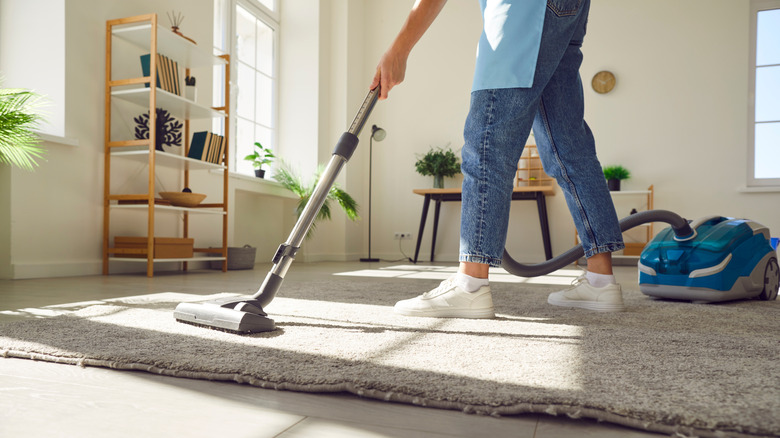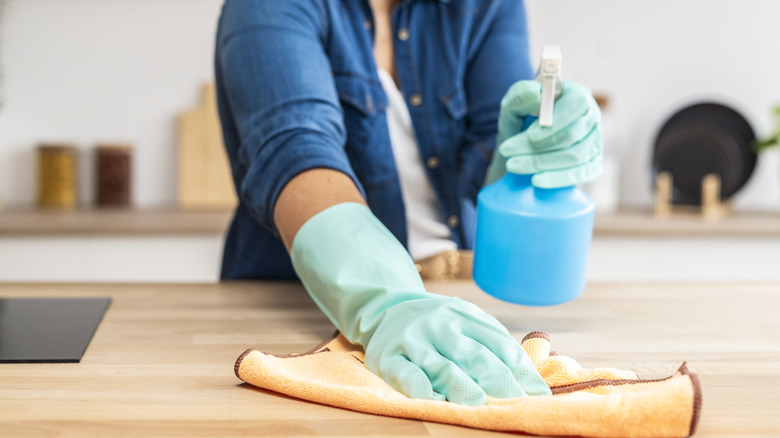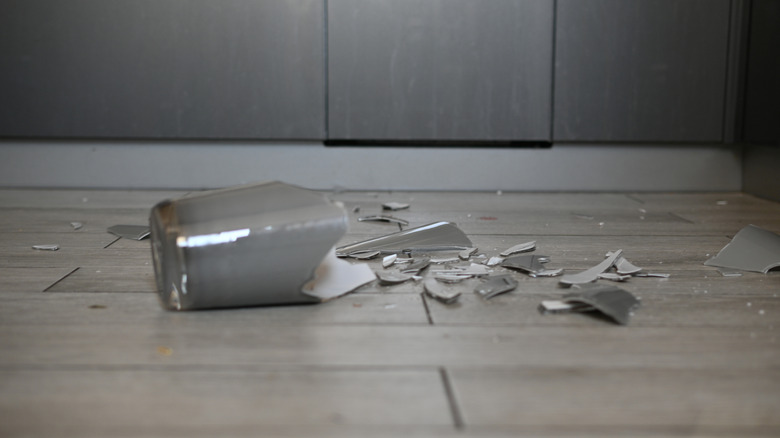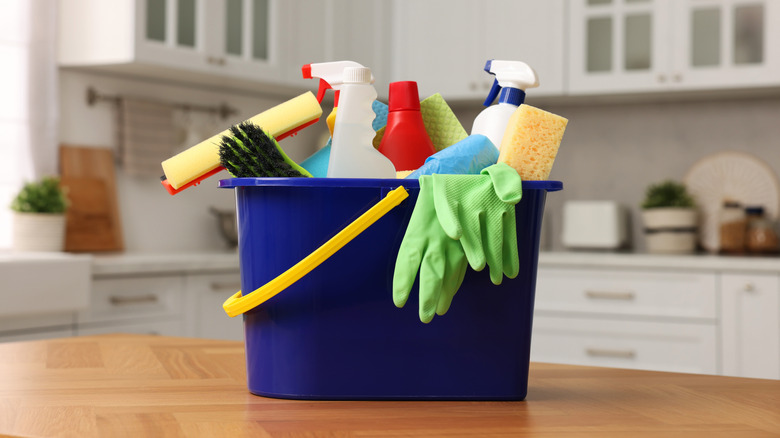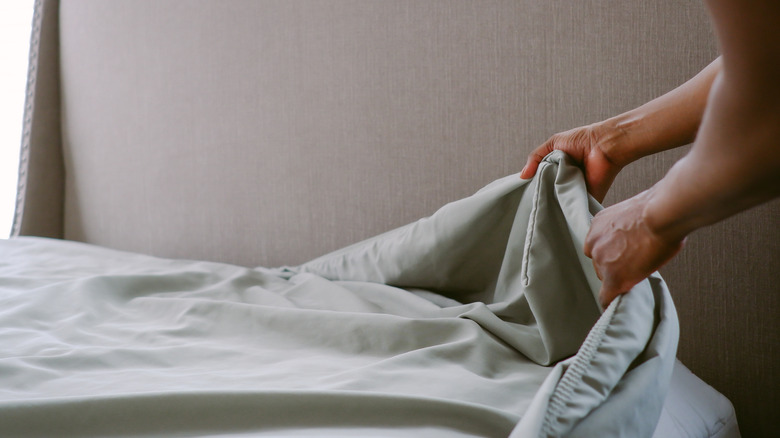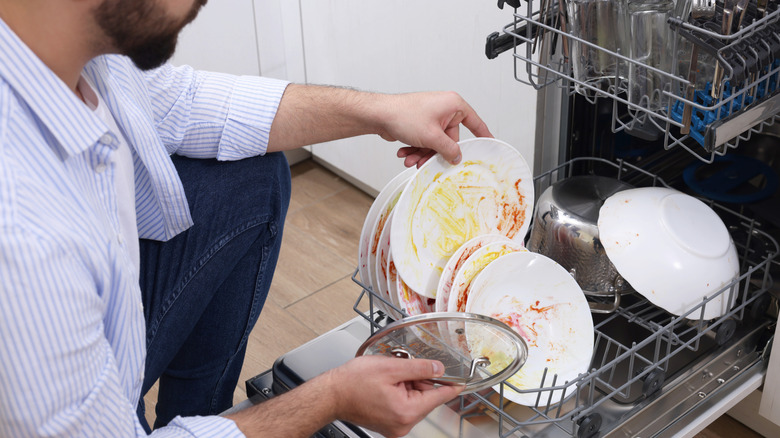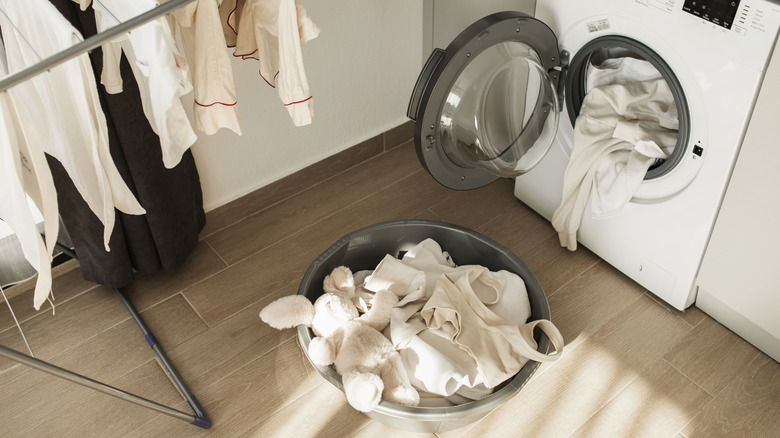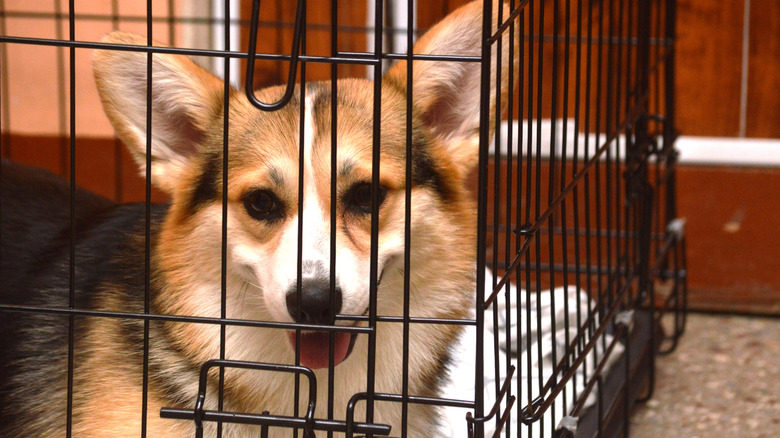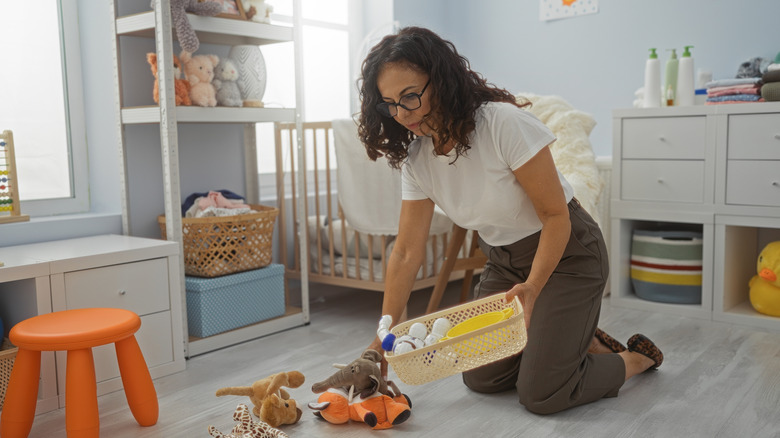11 Smart Prep Tips To Maximize Every Minute Of Your House Cleaner's Visit
We may receive a commission on purchases made from links.
There are a few smart prep tips you can use to maximize every minute of your house cleaner's visit. House cleaning is expensive and is often charged by the hour. The national average is about $200 to $400 for a 2,000 square foot house. With prices that high, you likely want to make the most of every single second your cleaning team is on site. That said, you shouldn't have to pre-clean your house just to pay someone else to come in behind you and clean it again. Instead, these tips are all about making things easier for your cleaners from the moment they step through your door.
This way, they won't be wasting time looking for cleaning supplies, hiding from your aggressive dog, or even spending ages getting a stain out of the carpet that's been there for years — all the while ignoring the rest of the mess in your house. Instead, following these tips means the areas in your home that are the highest priority are always addressed and you won't have to put in hours of extra work ahead of their arrival, either. Plus, follow this advice and your cleaners won't think you're a nightmare client.
Create a cleaning plan ahead of time
When you hire a professional cleaning service, talk openly about what's most important to you. This can make each minute of their visits much more efficient. If you live in a large house, maybe create a simple breakdown of zones or tasks to guide them so they don't waste time wondering what you want focused on. You could say something like: "Skip the guest room today because no one's used it, but please deep clean the master bath, especially the shower grout, as it's quite moldy." Be specific about your preferences. It's also totally okay to rotate priorities visit to visit. For example, one week you might ask them to really tackle the blinds and windowsills, and the next, to spend extra time on the kids' bedrooms because they just had a sleepover with friends.
If there is something you think might draw their attention, but you don't care about it too much, let them know not to focus on it, as it might waste valuable time. For example: "Don't worry about the stains on the rug in the playroom, I would much rather it just be freshly vacuumed than old stains worked on today, since we have limited time." If you have a particularly large house, giving them a tour and showing them where everything is can also be beneficial. That said, once the cleaning begins, it's best to give them space. After all, no one likes being micromanaged.
Move any especially breakable or sentimental items somewhere safe
Before your cleaning service arrives, take a moment to walk through your space and identify anything especially fragile, irreplaceable, or emotionally significant to you. Moving these items to a safe location can help prevent accidents and give both you and your cleaners peace of mind. For example, if you have a delicate vase perched on a narrow side table, or a collection of glass figurines on an open shelf, relocate them to a cabinet or a more secure area — at least temporarily. Even something as meaningful (and potentially disastrous!) as a container of a loved one's ashes should be carefully stored away or clearly pointed out if it's in an unusual or unstable spot. This step isn't about a lack of trust. Cleaners are professionals who do their best to be mindful, but accidents can still happen, especially in unfamiliar environments. Sometimes furniture gets bumped or cords get tangled while vacuuming, and it's better to be safe than sorry.
If there are a few items you don't want to move, but are concerned about, simply pointing them out during the first walk-through is a good solution. You might say: "Just so you know, this statue is very fragile and wobbly. Feel free to clean around it without touching it." Giving your cleaner a heads-up about any unique features in your space means they can work quickly without worrying about breaking sentimental items, which might slow them down.
Gather cleaning supplies and leave them in an accessible location
If your cleaning crew uses your supplies, whether because you asked or as part of their usual routine, having everything ready and easy to find can help the cleaning move faster. For instance, if you prefer natural cleaning ingredients, want to avoid certain scents like lavender, or have a special polish for your wood furniture, gather those beforehand and put them in one easy-to-access place. That way, your cleaner won't have to waste time looking through cabinets or closets to find what they need. The same applies to tools and equipment. If your cleaner uses your vacuum, mop, or steam cleaner, make sure everything is in good working condition. Check that batteries are charged, filters or pads are clean, and any attachments are readily available.
It also helps to choose a consistent location to keep all the supplies, like a shelf in the laundry room or under the kitchen sink. When everything is stored in the same place each time, your cleaner knows exactly where to look and can get started without any confusion. If something is missing or your preferences have changed, leaving a short note or giving a quick heads-up in person will help keep things on track and on time.
Strip the beds and place a fresh linen set near them
If you have your cleaners change your sheets, and you normally make your bed each morning, you can simply skip that step on cleaning day and strip the sheets instead. Removing the used bedding ahead of time saves them the trouble of handling your dirty sheets, giving them a head start on making your bed fresh and new. It also makes sure they aren't guessing which beds in the house need fresh linens. They'll know if it's stripped, then the bed needs some attention.
To make things even easier for them, place the clean sheet sets on or near each stripped bed. This way, your cleaner doesn't have to spend extra time searching through closets or drawers trying to assemble a matching set. Instead, leaving them a neatly stacked pile with a fitted sheet, flat sheet, and enough pillowcases makes the process super seamless! If you want them to change your duvet cover, be sure it's washed, dried, and ready for installation, so they don't have to waste time waiting for it to dry. It's worth it to wake up extra early on cleaning day to make this happen, because even using the viral burrito method to put on your duvet cover can still be tough for most folks.
Clear dishes from the sink and counters
Doing a quick tidy-up of your kitchen in the morning helps your cleaner start their work right away when they arrive. If you don't have a dishwasher, try to wash, dry, and put away your dishes ahead of time. This allows your cleaner to access the full surface area of your counters and sink without having to move dirty dishes out of the way. If you do have a dishwasher, make sure it is at least fully loaded and running by the time the cleaners arrive. If the dishes are clean, go ahead and empty it so the team doesn't have to work around clean dishes either, or can put stray items in the machine instead of leaving them in the sink.
That said, your cleaner's time is best spent on tasks like cleaning your countertops, scrubbing behind the cookie jar, and sanitizing small appliances. If they have to stop and clear away breakfast plates or wash up the remnants of a busy morning, it cuts into the time they can spend on those deeper, more detailed cleaning tasks, which are what you likely hired them to handle in the first place.
Gather dirty laundry and place it in baskets
Unless you pay extra for a laundry service, house cleaners typically don't handle laundry, too. However, they will clean laundry rooms, vacuum closets, etc. It's important to make sure dirty clothes aren't scattered around the house when they get there, so they can work quickly, instead of trying to work around the mess. Before the team arrives, take a few minutes to gather any dirty laundry from around your home. Put all of it in one spot, so it's at least contained. Ideally, laundry should be off the floor entirely, especially in smaller or high-traffic areas, so that cleaners can vacuum, mop, or sweep without needing to move piles of clothing (which some services might refuse to do, anyway. You'll have to pay extra for them to deal with dirty underwear!).
If you don't have an organized laundry room and it's already a disaster, go ahead and start a load if you have time. Placing the remaining laundry in baskets that sit on top of the washer and dryer will also free up floor space for your cleaner to see what they're doing. Leaving clothes piled in front of the washer or dryer not only makes cleaning more difficult, but it can also lead to confusion about what's clean and what's not.
Declutter major surfaces for easier dusting
If you use your kitchen table as a dumping ground, or your entryway is full of things, or your bedside table has 13 half-empty bottles of water on it, take a moment before the cleaners arrive to declutter a little bit. This way, they can focus more on deep cleaning and not trying to figure out where everything goes. In fact, some cleaners actually won't even clean surfaces that are super cluttered. They might wipe around the stacks of homework or shelf full of knick-knacks, but if it's chock-full of things that don't belong there, they might just leave it alone entirely, because they don't want to disturb your personal items. So, you're ensuring you're getting the full service by tidying up.
Yet, sometimes, there isn't a space to put everything — especially if it pertains for a specific, temporary task like a child's school project. Or you don't actually have enough time before the cleaners arrive to organize a week's worth of buildup on your table. Don't worry. If circumstances really are that dire, you can just take everything put it in your car temporarily or even shove it into a closet or cabinet you ask your cleaners to skip. And if you ever feel bad about this, please don't. Even HGTV star Joanna Gaines uses this trick to organize.
Make other arrangements for your pets
As much as we love our pets, not everyone is equally comfortable around animals — especially when they're trying to work. Making a plan for them before your cleaners arrive can make the visit go more smoothly for everyone involved. Even the most well-behaved pets can get too curious, bark, hide underfoot, or become anxious around strangers or loud equipment like vacuums. That's why it's helpful to put them in a safe, familiar space while your cleaner is working so that the team doesn't waste time avoiding aggressive animals, or trying to secure them themselves.
For example, you might place your cat in a quiet room with the door closed, or in a carrier with their favorite blanket and a toy to keep them calm. If you have a dog, consider putting them in the backyard, a crate, or a separate part of the house where they won't be in the way. If your dog is very energetic or territorial, you might even schedule a walk with a friend or a quick trip to doggy daycare during the cleaning time. Whatever your arrangement, it's best to have it handled before your cleaner arrives. That way, you're not scrambling to round up a hiding cat or leash an excited dog while your cleaner is trying to start their work, which might slow them down or frighten them, throwing them off their game.
Prep the floor so they don't have to tidy it
One of the most helpful things you can do before your cleaner arrives is to take a few minutes to clear the floors of everyday clutter. While it's completely normal for shoes, toys, bags, and other random household odds and ends to collect on the floor throughout the week, picking them up ahead of time allows your cleaner to get straight to work on the actual cleaning. When the floor is clear, your cleaner can easily vacuum, mop, and scrub without having to pause and move items from room to room. If they're constantly shifting things around just to reach the surface underneath, it eats up valuable time. This is time that could be spent deep cleaning the floors, wiping baseboards, or getting into corners that are often missed during daily upkeep.
Try to walk through high-traffic areas before the visit and do a quick reset. Place shoes in the closet or on a rack, toss toys into bins, and gather up things like backpacks, mail, and other small items that tend to get left around. If you have young kids, enlisting them to help pick up their toys can also be a great way to involve them in preparing for the cleaner.
If you are doing a particularly deep clean, prep the space for them
When you're planning for a deep clean like a big seasonal refresh, move-out service, or just a more intensive visit, taking a few extra steps to prepare your space can help your cleaners do a more thorough job. Deep cleaning often involves areas that aren't part of a regular visit, like under major appliances, behind furniture, or in high or hard-to-reach spots. If you want those areas addressed, making sure they're accessible beforehand is key to making the most of the time you have the team on-site.
For example, if you'd like your cleaner to vacuum or mop behind the refrigerator or stove, go ahead and carefully pull those appliances forward a bit so the space is open. Most cleaning services don't move heavy items on their own, either for safety reasons or to avoid damaging flooring or appliances, so your help here ensures the job gets done properly. If you're having carpets deep cleaned, you can speed up the process by stacking chairs on tables, lifting smaller furniture off the floor, if possible, and moving lightweight items out of the way. This provides a clear path and helps your cleaner or carpet technician focus on the actual cleaning, rather than rearranging your space.
Keep drains unclogged
Checking to be sure your shower and sink drains are unclogged is a great thing to do before your cleaners arrive. If there's a big hairball in the way, your cleaners' schedule might then get derailed by trying to dislodge the clog. This can take a while, and their cleaning skills are better used elsewhere in the bathroom for how much they cost per hour.
Clogs in the shower in particular typically happen when too much hair gets washed down the drain. When combined with soap scum and cleaning products, these wads can become so thick that water has a hard time getting through. The Forlivese Drain Snake is a great option. You can use it about once every two weeks or so to grab any hair from the drain before the clog gets too big. Drano Max Gel Drain Clog Remover and Cleaner is a great alternative if the clog seems to be too deep in the pipe to reach with a smaller drain snake, or if you feel you need some chemical help.
